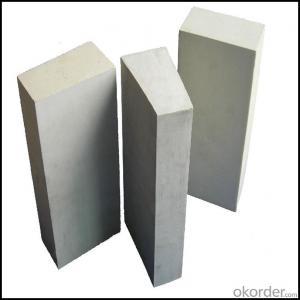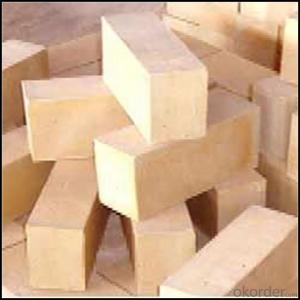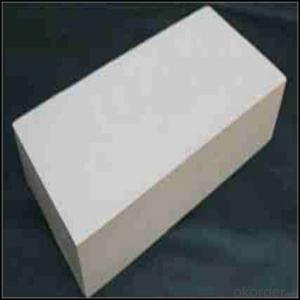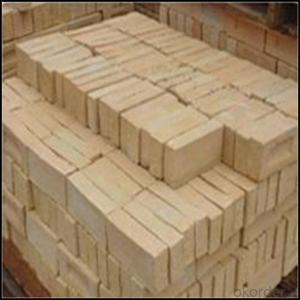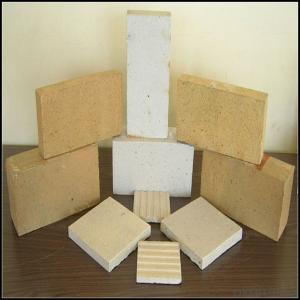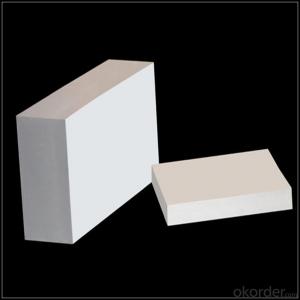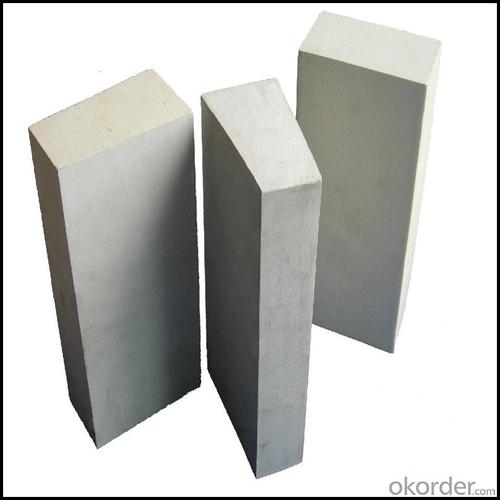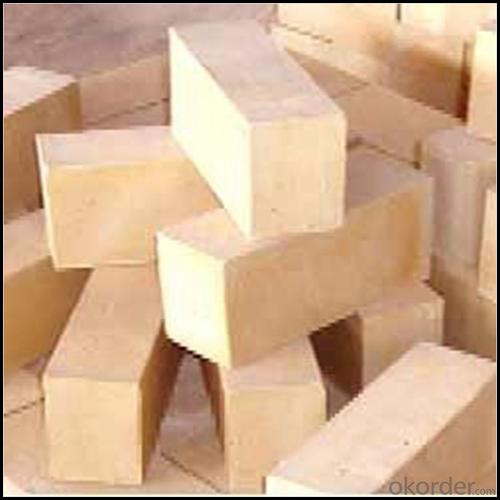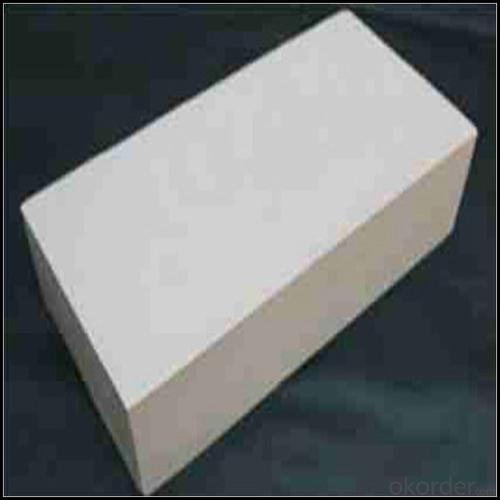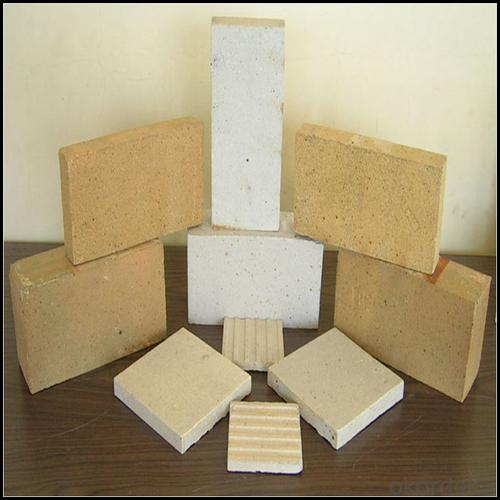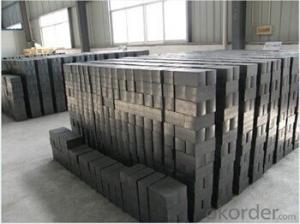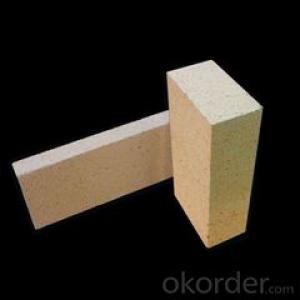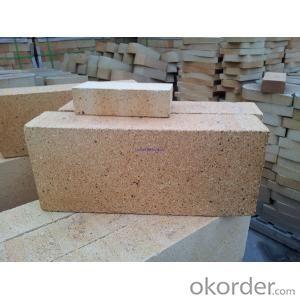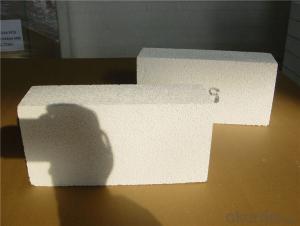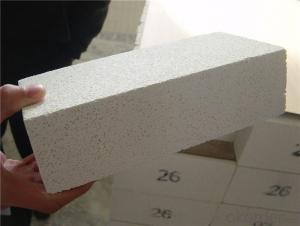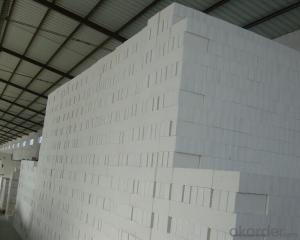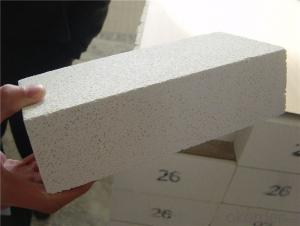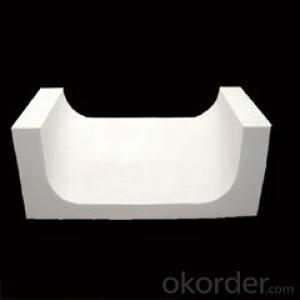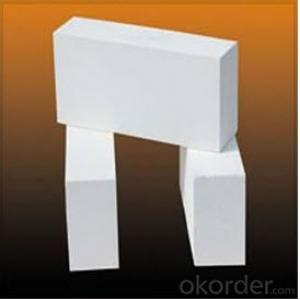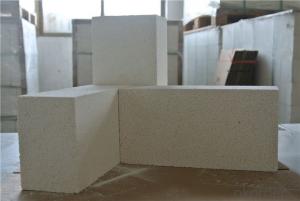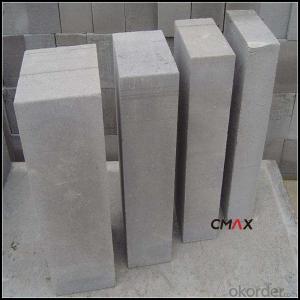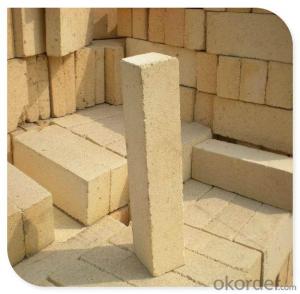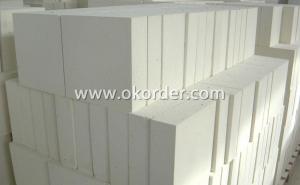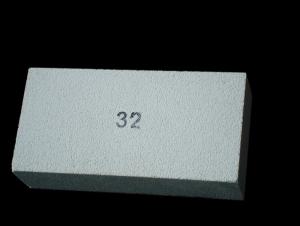Insulating Fire Brick - Refractory Brick for Furnace, Fire Brick Prices, Clay Brick
- Loading Port:
- China main port
- Payment Terms:
- TT OR LC
- Min Order Qty:
- 0.01
- Supply Capability:
- 2200 m.t/month
OKorder Service Pledge
OKorder Financial Service
You Might Also Like
Acid Resistant Brick
CMAX firebricks are classified under temperature between 1300℃ to 1700℃, manufactured from high purity alumina clay by mixing, press-forming, drying, sintering and machining. Bricks contain carefully-graded organic fillers which are burned out during sintering to give a uniform controllable pore structure. This technique makes product feature low thermal conductivity and excellent heat insulation
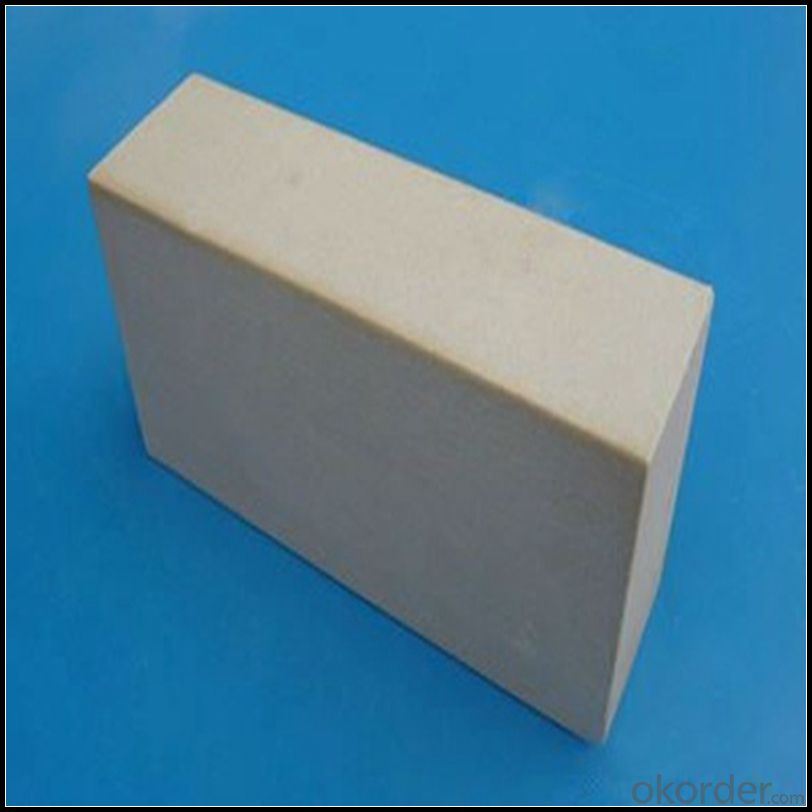
Features
Light weight and low thermal conductivity allows thinner furnace walls
Maintain stable structural strength throughout ambient to maximum service temperature
Low heat storage results in rapid cooling and heating operation
Low iron and impurities to enhance reducing atmosphere
High thermal shock resistance in preventing spalling
Non standard sizes and shapes are available upon request
Application
1. Building materials for blast furnace
2. Building materials for hot-blast stove
3. Building materials for coke oven
4. Building materials for steel making furnace
5. For construction material in steel industry
6. For ladle
Data Sheet
Classification Temperature (℉/℃) | 3000/1650 |
Bulk Density (g/cm3 ) | ≤1.0 |
Thermal Conductivity | |
800℃, W/m.K | ≤0.39 |
1000℃, W/m.K | ≤0.43 |
1200℃, W/m.K | ≤0.48 |
Reheating Linear Change (%) | 1550℃×12h |
≤0.9 | |
Chemical Composition (%) | |
Al2O3 | ≥75 |
Fe2O3 | ≤0.5 |
Packaging & Shipping
Packaging Details:Be packed in fumigated wooden pallets
Delivery Detail: 30 days after order

Our Services
Optimum solution and product supply of refractories for high temperature industries, such as iron steel, non-ferrous, petrochemical and building materials.
Engineering design, contract and consult for refractories, and civil architecture design.
Research, development, manufacture and sale of superhard materials.
R&D, manufacture and sale of special packing materials for export.
Inspection, supervision and arbitration of refractories.
Consultation and services in refractories information.
Training and cultivation of high-level talents in refractories profession
Sales Network

Company Information
CNBM (China National Building Material) Group is the largest comprehensive building materials group in China that in integrate scientific research, manufacturing and logistics into one entity. The largest building materials and equipment specialists in China. Upon State Council approval, today CNBM owned more than 300 subordinate manufacturing factories and servicing companies. There are 6 fully owned public listed companies and 11 partially owned with substantial shares public listed companies. In many of these fields, CNBM is playing the leading role in the building industry in the country.
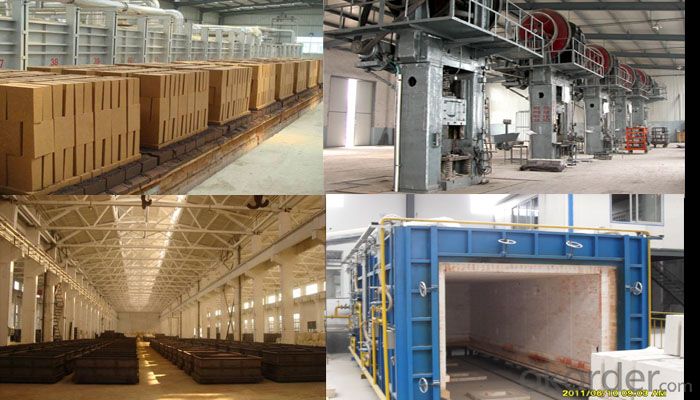
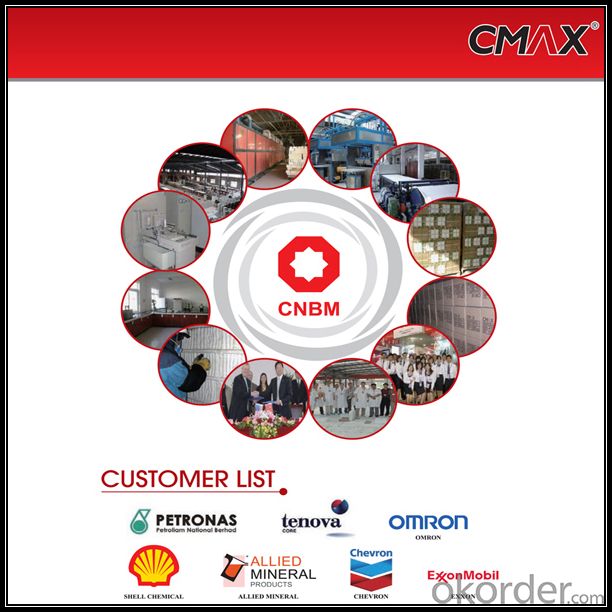
FAQ
1. Which products do you have?
We have all kinds of refractory brick, castable, mortar, cement, ceramic fiber products, etc.
Or you could browse our products to choose what you need.
2. Can you give me a brief introduction of the application of your products?
We are mainly specializing in the refractory materials in iron and steel, cement, glass, ceramics, petrochemical, electric power Industry, etc.
3. If I need your offer, what information do you need?
In order to choose suitable products, it will be appreciated to provide us the information, such us specification, technical data, order quantity, products application etc. If any question, please contact us freely.
- Q: Are insulating fire bricks resistant to insect infestation?
- No, insulating fire bricks are not resistant to insect infestation.
- Q: Can insulating fire bricks be used in high-temperature insulation boards?
- Yes, insulating fire bricks can be used in high-temperature insulation boards. Insulating fire bricks are designed to withstand high temperatures and provide excellent thermal insulation. They can be easily incorporated into insulation boards to enhance their insulating properties and increase their resistance to heat.
- Q: Can insulating fire bricks be used in the construction of pottery ovens?
- Insulating fire bricks are suitable for the construction of pottery ovens. They possess exceptional thermal properties, including low thermal conductivity and high heat resistance. These characteristics make them perfect for insulation and heat retention in pottery ovens, facilitating efficient and controlled firing of clay and ceramic materials. Furthermore, their lightweight nature simplifies handling and installation during construction. Ultimately, incorporating insulating fire bricks in pottery ovens ensures consistent and uniform heat distribution, leading to enhanced firing results and energy efficiency.
- Q: Can insulating fire bricks be used for insulation in power boiler walls?
- Yes, insulating fire bricks can be used for insulation in power boiler walls. Insulating fire bricks are specifically designed to have low thermal conductivity, allowing them to effectively insulate high temperature environments such as power boilers. They are made from lightweight materials such as clay and other refractory materials, which provide excellent insulation properties while withstanding the extreme heat conditions found in power boilers. The use of insulating fire bricks in power boiler walls helps to reduce heat loss, improve energy efficiency, and maintain high operating temperatures within the boiler.
- Q: Can insulating fire bricks be used in foundries?
- Yes, insulating fire bricks can be used in foundries. They are commonly used as lining materials for various high-temperature applications, including foundries. Insulating fire bricks provide excellent thermal insulation, reducing heat loss and improving energy efficiency in the foundry process. Additionally, they have good resistance to thermal shock and can withstand the extreme temperatures and harsh conditions often found in foundry environments.
- Q: Can insulating fire bricks be used in the construction of blast furnaces?
- Yes, insulating fire bricks can be used in the construction of blast furnaces. Blast furnaces require insulation to maintain high temperatures, and insulating fire bricks offer excellent thermal insulation properties. These bricks are made from lightweight materials such as clay and alumina, which can withstand high temperatures without melting or deteriorating. They have low thermal conductivity, meaning they can effectively reduce heat loss and conserve energy within the blast furnace. Additionally, insulating fire bricks have good resistance to chemical reactions, making them suitable for the harsh conditions present in blast furnace environments. Overall, insulating fire bricks are a preferred choice for blast furnace construction due to their insulation capabilities and ability to withstand high temperatures.
- Q: Can insulating fire bricks be used in the construction of brick ovens?
- Brick ovens can indeed utilize insulating fire bricks. These specialized bricks possess exceptional thermal insulation characteristics, which make them highly suitable for applications that require efficient heat retention, such as brick ovens. Crafted from lightweight refractory materials, these bricks exhibit a lower density compared to standard clay bricks, thereby minimizing heat loss and enhancing energy efficiency. When constructing a brick oven, it is crucial to contemplate the insulation layer responsible for preserving and evenly disseminating heat throughout the oven. Insulating fire bricks can be employed to create this insulation layer, typically positioned between the inner cooking chamber and the outer oven layer. By utilizing these bricks, heat transfer to the outer layer is minimized, preventing excessive heat dissipation and ensuring the oven attains and maintains the desired high temperatures essential for baking or cooking. Apart from their impressive thermal insulation properties, insulating fire bricks also exhibit remarkable resistance to thermal shock. This signifies their ability to endure abrupt temperature changes without cracking or fracturing. This quality is particularly valuable in brick ovens, as they frequently encounter significant temperature fluctuations during the baking process. To sum up, insulating fire bricks are a fitting and highly recommended choice for constructing brick ovens due to their thermal insulation properties, lightweight composition, and resilience to thermal shock. By utilizing these bricks, a well-insulated and efficient oven can be created, capable of achieving and sustaining high temperatures for optimal baking or cooking outcomes.
- Q: How do insulating fire bricks contribute to reducing heat loss?
- Insulating fire bricks contribute to reducing heat loss by their unique thermal properties and design. These bricks are made from insulating materials, such as ceramic fibers or lightweight refractory aggregates, which have low thermal conductivity. This means that they are not easily conductive to heat transfer, preventing the transfer of heat from one side of the brick to the other. Furthermore, the structure of insulating fire bricks includes small air pockets or voids within the material. These air pockets act as thermal barriers, as air is a poor conductor of heat. When heat tries to pass through the brick, it gets trapped within these voids, significantly reducing heat transfer. The insulating properties of these bricks help to create a thermal barrier in various applications, such as industrial furnaces, kilns, and fireplaces. By using insulating fire bricks as lining or insulation material, the heat loss from these systems is minimized. This not only helps to maintain a more stable and uniform temperature within the enclosed space but also increases energy efficiency by reducing the amount of heat wasted. In addition, insulating fire bricks are resistant to high temperatures, ensuring that they do not degrade or lose their insulating capabilities when exposed to extreme heat. This durability allows them to provide long-lasting insulation and contribute to reducing heat loss over an extended period. Overall, insulating fire bricks are highly effective in reducing heat loss due to their low thermal conductivity, presence of air pockets, and high-temperature resistance. Their incorporation in various thermal systems helps to conserve energy, improve thermal efficiency, and create a more comfortable and controlled environment.
- Q: Can the whole wall of the high-rise building be made of grey insulation bricks?
- As can be seen from the picture, the aerated concrete block should be 200MM thick. According to the regulations, it is possible because the building is a frame structure.
- Q: Can insulating fire bricks be used for insulation in heat treatment furnaces?
- Yes, insulating fire bricks can be used for insulation in heat treatment furnaces. Insulating fire bricks are designed to handle high temperatures and provide excellent thermal insulation, making them suitable for use in heat treatment furnaces where maintaining a consistent and controlled temperature is crucial.
Send your message to us
Insulating Fire Brick - Refractory Brick for Furnace, Fire Brick Prices, Clay Brick
- Loading Port:
- China main port
- Payment Terms:
- TT OR LC
- Min Order Qty:
- 0.01
- Supply Capability:
- 2200 m.t/month
OKorder Service Pledge
OKorder Financial Service
Similar products
Hot products
Hot Searches
Related keywords
